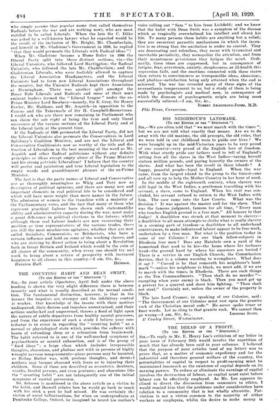HIS NEIGHBOUR'S LANDMARK. [To THE EDITOR OF THE " SPECreTOE."]
Sin,—We are often told that " we must march with the times "; but we are not told what exactly that means. Are we to do away with the old maxims, the old precepts, the old rules, that we were told in our childhood were to guide our lives ? We were brought up in the mid-Victorian years to be very proud of our country—very proud of the English love of freedom. With what sturdy pride our fathers used to tell of England's setting free all the slaves in the West Indies—taxing herself sixteen million pounds, and paying honestly the owners of the slaves. And what has been the result in those islands ? A happy, peaceful people—loyal to England. When the war came, from the largest island in the group to the tiniest— one and all rose up to help the Mother Country in her hour of need.
In the middle of the eighteenth century, when slavery was still legal in the West Indies, a gentleman travelling with his servant, a slave, came to England. When his visit was con- cluded, his servant refused to return to the West Indies with him. The case came into the Law Courts. What was the decision ? It was against the master and for the slave. That was the famous judgment, famous for all time, "Every man who touches English ground is a free mass." All honour to that Judge! A deathblow was struck at that moment to slavery— a deathblow to all mean attempts to clothe what is really slavery in a seeming garb of freedom—a deathblow to all underhand contrivances, to make indentured labour appear to be free work, undertaken by a free man. But what is the position to-day in some of our Colonies ? Are our black fellow-subjects in Rhodesia free men ? Does any Matabele own a yard of the homestead that used to be his—the home where his forbears lived—the ground hard by where his ancestors are buried ? There is a service in our English Church, the Commination Service, that is a solemn warning to wrongdoers. What does it say ? "Cursed is he that removeth his neighbour's land- mark "—unless his neighbour is black, we must add, if we are to march with the times, in Rhodesia. There are such things as the Ten Commandments. "Thou shalt do no murder "- excepting when your enemy is black. Then you must get up a pretext for• a quarrel and shoot him fighting. " Thou shalt not steal." Certainly not, unless the owner of the property is black.
The late Lord Cromer, in speaking of our Colonies, said : " The Government of our Colonies must rest upon the granite rock of the Christian moral code." He .never spoke truer or finer words. Let us cling to that granite rock. We cannot then
go wrong.—I am, Sir, &c., LEONORA SCOTT.
17 Cowley Street, Westminster.


































 Previous page
Previous page